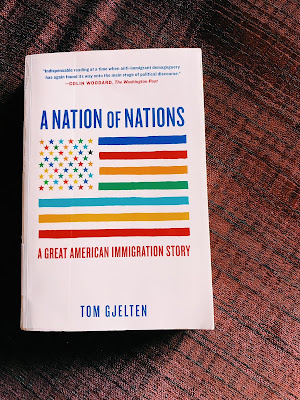Exploring the American Immigration Story in Tom Gjelten's "A Nation of Nations"
Growing up, I often heard America referred to as the great "melting pot" of the world. From sea to shining sea, the United States was a land of opportunity, filled with a diverse array of individuals with roots all over the world. Whether Black, White, Asian, Latino, or even mixed (like myself), here was a place where we could come together under one flag and proudly take up the shared identity as "American", in spite of our racial or ethnic differences.
As I got older and came to learn more about American history (along with discovering the realities of human nature), I came to realize that this "melting pot" status brought many implications for our nation, both positive and negative. I soon enough observed that not everyone cherished our country's diversity in the same way I was brought up to. Immigration, and the blending of cultures and ideas it produced, was viewed by some as a threat to the so-called values of our nation. As someone who is the child and grandchild of immigrants, this notion was utterly preposterous. I was especially dumbfounded to discover that individuals could still harbor such archaic views in the 21st century. After reading Tom Gjelten's A Nation of Nations however, I came to the sad realization that these prejudiced attitudes are simply the echoes of centuries of distorted views on immigrants, which have unfortunately been in existence since our country's founding.
The book offers a fairly comprehensive and insightful analysis of our nation's immigration history, from the first immigration law passed by Congress in 1790 (which offered U.S. citizenship only to "free white persons"), all the way to the immigration debates and restrictions imposed in the aftermath of 9/11, many of which carry into the present day. Throughout his historical survey, Gjelten also follows the individual stories of migrants hailing from countries such as Bolivia, South Korea, and Libya, and their eventual resettlements in Fairfax County, Virginia during the latter half of the 20th century. These stories offer a more humanized perspective on the immigration debate, demonstrating the myriad of struggles and obstacles faced by migrants upon their arrival to the United States. Through their tales one comes to realize that getting to America is often only half the battle immigrants face in their resettlement journeys.
The hardships faced by these immigrants certainly evoke sympathy, but even stronger than this sentiment perhaps is the admiration one comes to develop for their work ethic. Immigrants are often stereotypically denounced as criminal, lazy, or otherwise a "threat" to American society. The accounts in A Nation of Nations however present the exact opposite narrative. Although pushed down and often cast aside, time and time again immigrants display their tenacity and determination by turning the other cheek and continuing to pursue their dreams. The lure of opportunity in America, although defined differently for each individual, proves to be a powerful, and the sacrifices migrants make in pursuit of these ambitions are truly inspiring and heartfelt.
While Gjelten doesn't really offer solutions to our country's centuries-long immigration debate (which is somewhat ironic to exist in the first place since the United States is a country almost entirely comprised of the ancestors of migrants), his insights highlight the struggle throughout our country's history to define what is truly means to be "American". As the ethnic and racial composition of our country only continues to change, he makes it clear that now more than ever do we need to wrestle with the concept displayed on the American seal of e pluribus unum or, "out of many, one". The fact of the matter is that we are ultimately a nation of nations, and it is up to all of us as Americans to decide how we will choose to represent this truth on both a national and global scale.


Comments
Post a Comment